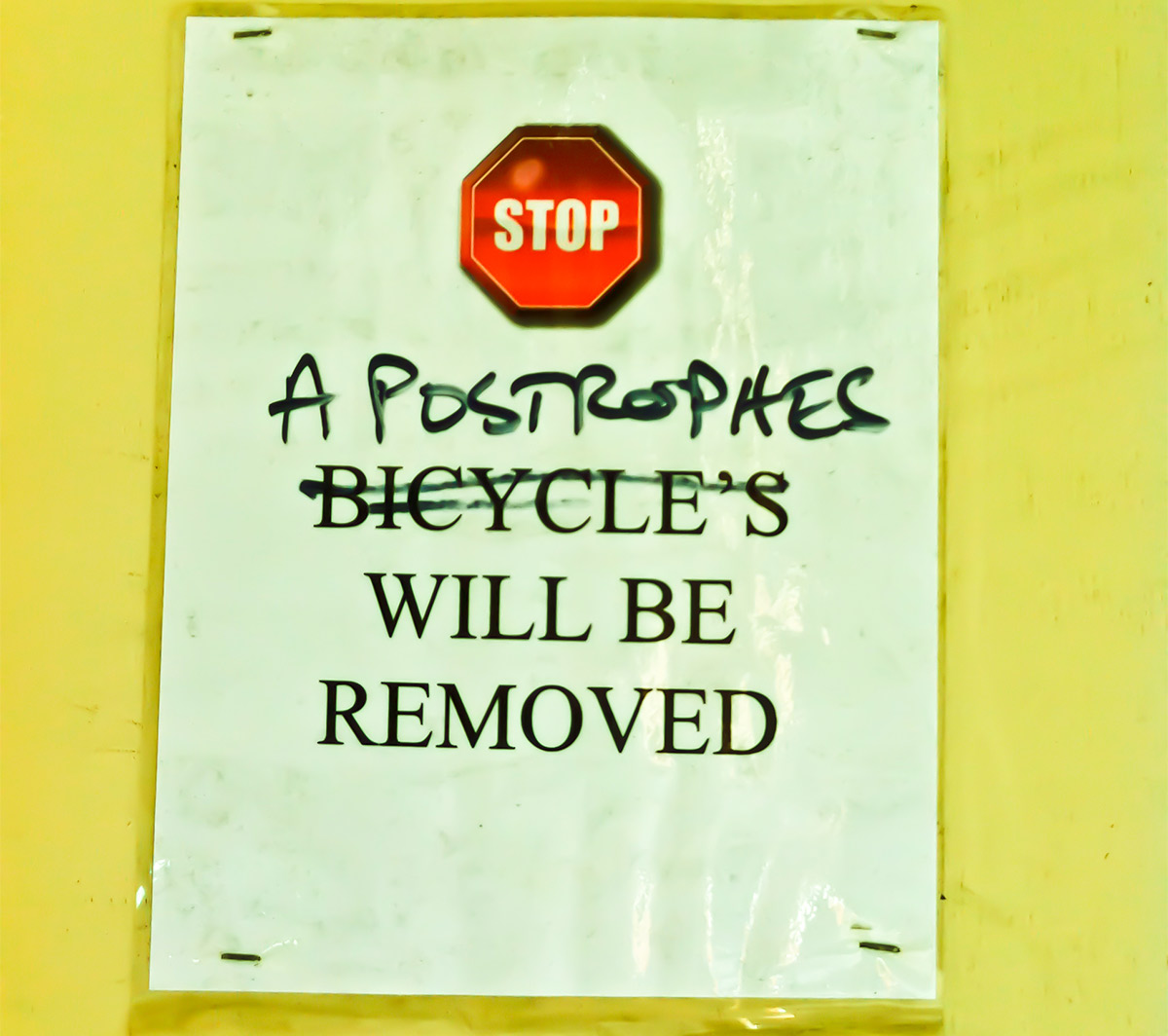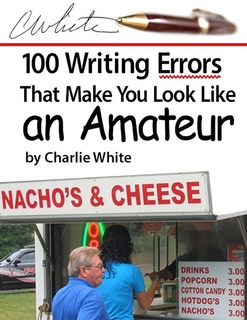
Even after listing 75 writing errors in parts one and two of this ongoing series, I haven’t mentioned hundreds more writing, usage and style errors that could seriously diminish a professional writer’s credibility.
I’m sure you aren’t one of those error-prone authors, and there won’t be a single thing on this list that trips you up. But you might want to take a look at it just to be sure.
1. Could care less: Think about this one for a second. It means the exact opposite of what its writer is trying to express. If you “could care less,” then you must feel a certain amount of concern. If you couldn’t care less, that means you don’t care at all.
2. Impactful: Sorry, corporate suits, but this is not a word. Think of some other actual words to use in your PowerPoint presentations, such as “powerful,” “interesting,” “compelling” or “engaging.”
3. Effect/affect: When you affect something you have an effect on it.
4. Excited for: Made popular by amateur bloggers by the millions, it’s hard to pinpoint who made this original mistake. But you’re not excited for anything, you’re excited about something. However, you’re excited for someone if you are supporting that person’s excitement. “I was excited for her because of her excitement about her impending graduation.”
5. To name a few: Along with its reflective and useless friend “that being said,” this is a writer saying he just named a list of things or said something. The readers know that. They just read what you wrote, so there’s no need to tell them you just named or said something. There a lot of problems with his term — it makes your writing lame, wordy and redundant, to name a few.
6. Moving forward: A favorite of jargon-afflicted Yahoo CEO Marissa Meyer, the term “moving forward” can almost always be avoided. Of course we’re moving forward. If you want to reference the future, why not just mention the future? Or say “from now on?” “Moving forward” is trendy corporate-speak that must be rolled back.
7. Plagiarism: Most professional writers know what plagiarism is, but apparently some politicians don’t. I’m referring to Republican Sen. Rand Paul, who made a fool of himself by plagiarizing, and then made it worse by demonstrating that he had no idea what plagiarism was. He talked about adding footnotes to everything he wrote, from now on. However, for those who might be thinking along the lines of Sen. Paul, plagiarism is presenting someone’s words or ideas as your own. In Mr. Paul’s case, it was word-for-word copying, the worst and most amateurish kind of plagiarism. Don’t do it. It could end your career.
8. Lead/Led: I didn’t think I’d have to include this one in my list of errors, but when I saw it used in highly professional publications more than once in a week, I could hardly leave it out. Yes, both of “Lead” and “Led” can sound the same, but they have completely different meanings. Confusing the issue is the dual pronunciation and meaning of the word “lead.” You can lead an army, and in the past tense you might have led them, but if you misuse these terms, it will go over like a lead balloon.
9. Who’s/Whose: “Whose” is the possessive of “who.” (Whose coat is this?) Only use “who’s” when you want a contraction of the words “who” and “is” (who’s who?). By the way, after typing it a few times, the word “who” looks absurd.
10. I posted a blog: No you didn’t. You posted in or on a blog. An article in a blog is not a “blog.” It’s a blog post. That’s like saying a reporter for The New York Times posted a newspaper.

11. Daylight Savings Time: A surefire sign of amateurism, there is no “s” in Daylight Saving Time. Somehow people got this confused with savings and loans. Drop the “s” or drop your credibility.
12. At this point in time: This important-sounding drivel exploded into popularity during the Watergate hearings in 1974. As the Congressional hearings droned on, the officials were striving to create a timeline for a cesspool of unfortunate incidents. They kept talking about “this point in time,” even though the words “in time” are implied and obvious. Tighten up your writing without adding extraneous words by saying “at this point” or “at this time,” a favorite of flight attendants. Just say what you’re actually talking about, such as “now,” “then” or the exact date to which you’re referring.
13. Use to: “Think of all those places we use to go.” This is an error made by people who don’t read much. In speech, it sounds exactly like the correct usage, “Think of all those places we used to go.” It’s in the past tense. If you make this mistake, read more.
14. 1990s, ’90s: Where do we put the apostrophe? Like all words, put the apostrophe where you have removed letters in the interest of brevity. In modern usage, there is no need for an apostrophe in “1990s,” but when you write “the ’90s,” you need that apostrophe when you’ve removed numerals. By the way, pro tip for speakers: when mentioning a year, call it “twenty-fourteen,” rather than “two thousand and fourteen.” This same tic happened at the turn of the 20th century, when many felt compelled to say “nineteen hundred and fourteen.” Thank goodness we’ve moved beyond the usage we often saw at the beginning of this century, when it often seemed necessary to say “the year” 2000.
15. Immigration/Emigration: Although these words are pronounced the same, they are as different as the words “incoming ” and “outgoing.” To “immigrate” is when you move into a country, and to “emigrate” is when you move out of a country. But then you’ll be an immigrant in another country. If you want to be an immigrant, you must first emigrate, because everybody must be somewhere.
16. Coming out: This term has gained a new meaning in recent years, thanks to LGBTQ individuals rightly claiming their civil rights. Let them have this term, and when you’re talking about a new product appearing on the market, say the product was released, published, introduced or shipped, rather than writing that a product is coming out. This is more a style point then an error, but don’t you think the following sentences sound better than using “coming out?”: “The new book will be published next month.” “Apple’s new iPhone ships in October.” “Arcade Fire’s new album was released last month.”
17. Racked/Wracked: When you’re thinking hard about something, you’re wracking your brain. When you’re situating billiard balls in a triangular rack, you’re racking them up.
18. Brothers-in-law, attorneys general: they’re not “brother-in-laws” or “attorney generals.” Make the person plural, and make singular the words designating that person’s status or office.
19. Parallelism: Instead of a wordy multi-sentence construction, place similar words in a series. It’s called parallelism. For instance, instead of writing, “I’ll bring the baseball and a bat. I’ll also bring along a couple of baseball gloves and a home plate, too,” make it a parallel series by writing, “I’ll bring the baseball, bat, a couple of baseball gloves and a home plate.” But make sure those words are related to each other, rather than “She brought skis, boots, gloves and got drunk.”
20. Jargon: When writing for general audiences, avoid using words known only to insiders of a particular profession. And please, don’t make up your own words, such as Melissa Myer’s construction, “We will cascade the goals down through the company.” Along those same lines, avoid using abbreviations that only insiders will know.
21. Nauseous/nauseated: “Nauseous” refers to a sickening effect something will have on others, while “nauseated” describes the result of a nauseous thing. Something doesn’t make you nauseous, it makes you nauseated. “The nauseous stench made me nauseated.”
22. Nor/Or: “Nor” means “and not.” If you’re mentioning something negative, followed by another negative thing, use “nor”. Remember it like this: “Nor” follows “neither,” “or” follows “either.” But it gets a little complicated if your sentence doesn’t contain the words “neither” or “either.” In that case, use the word “or” if the second negative condition is a noun, adjective or adverb. If that second negative condition is a verb, use “nor.” For example, “I am neither happy nor sad.” “I can’t figure out if I am happy, sad, excited or bored.” “I have no qualms, scruples, nor am I nostalgic.”
23. Brake and Break: I didn’t think I’d need to add this obvious error to my list, but when I noticed that the clueless editor of a prominent website couldn’t tell the difference between these two words, I felt compelled to include them. Of course, if you break your brakes, you’re in for a hell of a ride.
24. Pique/peek/peak: If your interest is piqued, don’t say it’s “peaked.” It seems like that ought to be correct, but it’s not. “My interest is piqued that the misusage of that term has reached its peak, a condition that could be alleviated if its users would take a peek at a book every once in a while.”
25. Penultimate: This is a word often misused by inexperienced writers who are trying to sound sophisticated. It doesn’t mean super-ultimate. It means next to the last. “The penultimate episode of Breaking Bad was better than its finale, some viewers argued.”
Read more writing tips:
Part 1: 50 writing errors that make you look like an amateur
Part 2: 25 more writing errors that make you look like an amateur
Images courtesy Flickr/Lee J. Haywood; Infomatique

Charlie White’s new eBooklet, 100 Writing Errors That Make You Look Like an Amateur, is now on sale! Pick up your copy here or as an iBook on iTunes.
